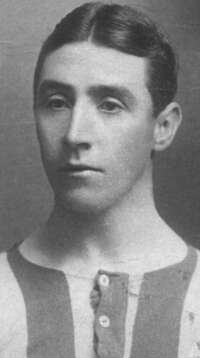|
Norman Fox, an experienced sports journalist, tells his story factually but with no little affection and clearly the deepest respect for the achievements of a man who was indeed seen by some as prophet, and by others in the football establishment as a traitor because he coached the ‘foreigners’ to such a high standard that English football was well and truly eventually left behind.
On a murky afternoon fifty years ago this November, England’s football team suffered their first ever defeat on home soil. But it was more than just defeat. England were humiliated 6 – 3 by the Hungarians, who won with their sometimes strolling, sometimes devastatingly swift and always beautifully controlled football. The Hungarians dedicated this victory to Jimmy Hogan who before the First World War had gone abroad after only a moderately successful playing career.
Hogan from a very early stage bemoaned the lack of skills coaching and ball work at the clubs he went to. This was the age of players being told if they trained without the ball they would want it all the more on Saturday. His own ball control was breathtaking so that when he turned to coaching he left some of the players open mouthed.
In Austria he lined up with Hugo Meisl with whom he worked to produce a team that came to Stamford Bridge in 1932 and nearly beat England. He moved to Hungary and coached MTK the club that later produced several of the magical Magyars. He preached total football long before the Dutch ever thought of it. He warned English clubs that the continentals were catching them up. In a later spell at Fulham the players rebelled against his doctrine of the need for proper coaching and skills work.
In later life he did some work at Aston Villa and Celtic. Tommy Docherty said he was the greatest influence of all on his career. In spite of his age in 1953 the press campaigned for him to be made England manager but the FA would have none of it.
Chapter Two of Norman Fox’s book and part of Chapter Three tells of his time at Burnley. The final chapter tells of his final years in Burnley the place he loved, and in fact in his final years he lived near enough to hear the sound of the roar of the crowd at Turf Moor. In the 72 / 73 season when Burnley won the Second Division Championship, he was invited to Turf Moor as Guest of Honour to watch Burnley beat Watford. It gave him great pleasure, as did any Burnley win. He died in Burnley General Hospital and was buried at the Rosegrove Cemetery. Dozens of tributes poured in from all over Europe. Sadly at his death though, he carried a lasting resentment that he had never been given credit by the powers that be, for his achievements, nor had been given the opportunity to take responsibility for the national team.
Between his early years in Burnley, to his return and death in January 74, Norman Fox tells a story that is packed with travelling and adventure. He was actually interned in Austria at the outbreak of WW1 but he did manage to get out of Germany quickly at the beginning of WW2. The research is scholarly. The attention to detail is impressive. The narrative is clear and easy to follow. One unique photograph from the small but impressive b&w collection shows him with the Burnley team at the beginning of the 1905 – 06 season and another at the age of 18 in the Nelson kit.
This is certainly a book that should be party of any collection of ‘Burnley’ books. Jimmy Hogan is part of our club history and heritage. The town of Burnley has produced three giants in the history of the game – Bob Lord, Charles Sutcliffe and Jimmy Hogan. The stories and contributions of the latter two may have faded into history. But thankfully, Prophet or Traitor now reminds us of what Jimmy Hogan contributed.
This is an excellent value book, 230 pages at a price of £9.95 available from Parrs Wood Press 0161 226 4466, website www.parrswoodpress.com
